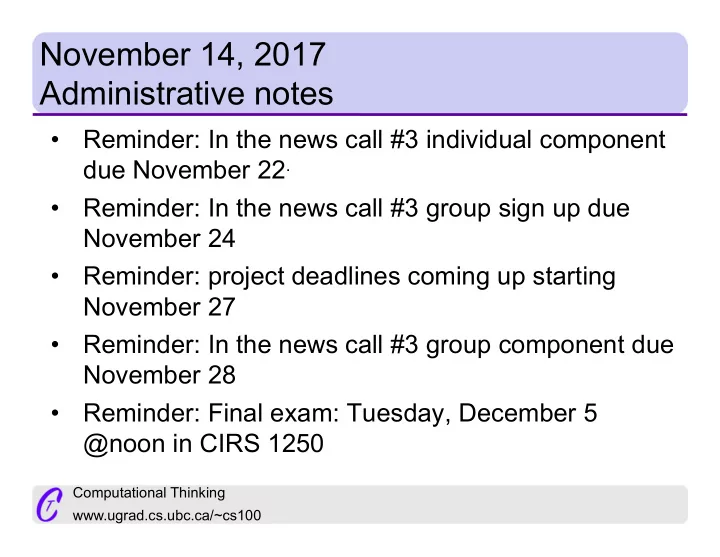

November 14, 2017 Administrative notes • Reminder: In the news call #3 individual component due November 22 . • Reminder: In the news call #3 group sign up due November 24 • Reminder: project deadlines coming up starting November 27 • Reminder: In the news call #3 group component due November 28 • Reminder: Final exam: Tuesday, December 5 @noon in CIRS 1250 Computational Thinking www.ugrad.cs.ubc.ca/~cs100
About that midterm… • This is a much different slide than I usually put up about midterms • I have very good assurances that we are all safe • The student who caused the disruption will not be returning to class • The student who caused the disruption is getting the support he needs • I will count the higher of either your midterm #2 grade or the final exam in lieu of your midterm #2 grade • Please do not feel bad if you discover that you were negatively effected and others weren’t • If you need to talk to a professional, the wellness website has resources: https://students.ubc.ca/health-wellness/mental-health-support- counselling-services • The average was 79% - instructions about how to see your graded midterm are on the exercises page Computational Thinking www.ugrad.cs.ubc.ca/~cs100
Now where were we… • We’d been discussing AI in science fiction, and had been looking in particular at Commander Data from Star Trek: The Next Generation • Let’s take another quick look to jog your memory: https://www.youtube.com/watch?v=p13LtGKd oBo&t=1m02s Computational Thinking www.ugrad.cs.ubc.ca/~cs100
That’s Science Fiction. How close to that are we today? In a group, discuss what of Data’s capabilities you believe we are able to get computers/robots to do today. - Robots today: easy to distinguish robots today from looking like humans - Walking: moves around without problems - The conversation: very different Computational Thinking www.ugrad.cs.ubc.ca/~cs100
Meet Watson: Going from Sci-Fi to reality! Jeopardy! IBM Watson https://www.youtube.com/watch?v=P0Obm0DBvwI&t=1m21s A cool article on this: http://spectrum.ieee.org/automaton/robotics/artificial- intelligence/watson-ai-crushes-humans-in-second-round-of-jeopardy Computational Thinking www.ugrad.cs.ubc.ca/~cs100
Group Exercise How complex was the language that Watson had to “understand” and produce? Compared to Data, what did Watson NOT have to do? - He had the information stored, but it wasn't as complex understanding - There's no speech recognition - Watson didn't need to act conscious - Had a whole range of things Watson didn't need to understand - The language that Watson is looking at is very limited. Very structured - Watson did have to connect two different concepts Computational Thinking www.ugrad.cs.ubc.ca/~cs100
Let’s take a look at how Watson “learned” Preparing Watson https://www.youtube.com/watch?v=i- vMW_Ce51w&t=8m43s We’ll look at some aspects of this in more detail later Computational Thinking www.ugrad.cs.ubc.ca/~cs100
Ooops… While Watson won, it did make an embarrassing mistake… http://www.youtube.com/watch?v=7h4baBEi0iA Watson clearly didn’t fully understand the question Computational Thinking www.ugrad.cs.ubc.ca/~cs100
Is Watson intelligent by Strong AI criteria? Clicker question A. Yes B. No Reminder: Strong AI – is epitomized by the Chinese Room (Section 6 of the reading) – the computer has to be able to THINK Computational Thinking www.ugrad.cs.ubc.ca/~cs100
Is Watson intelligent by Strong AI criteria? Why or why not? - It's playing Jeopardy, it's made for one purpose, pulling out of that context it may struggle - Watson vs. Data, Watson isn't even close - yes: Toronto was an interesting answer, it had some "thought" process - There's clearly no common sense check Computational Thinking www.ugrad.cs.ubc.ca/~cs100
Is Watson intelligent by Turing/weak AI criteria? Clicker question A. Yes B. No Reminder: Weak AI is epitomized by Turing’s approach – the computer just has to APPEAR intelligent – fool a person for 5 minutes that it’s human Computational Thinking www.ugrad.cs.ubc.ca/~cs100
Group discussion: Is Watson intelligent by Turing/weak AI criteria? - He could answer most questions correctly - Jeopardy can only have one type of response, so it wouldn't be able to have a full conversation necessarily - Narrow AI: a computer program that's only profficient at one task - In 5 minutes it'd probably make a basic factual error Computational Thinking www.ugrad.cs.ubc.ca/~cs100
What is Watson up to now? Fighting cancer… “Using a Watson app developed with Baylor College of Medicine called KnIT (Knowledge Integration Toolkit) that reads and analyzes millions of scientific papers and suggests to researchers where to look and what to look for, a Baylor team has identified six new proteins to target for cancer research. How hard is that? Very. In the last 30 years, scientists have uncovered 28 protein targets, according to IBM. The Baylor team found half a dozen in a month.” http://time.com/3208716/ibm-watson-cancer/ Computational Thinking www.ugrad.cs.ubc.ca/~cs100
What is Watson up to now? Cooking… “Researchers at IBM have teamed up with the Institute of Culinary Education in New York. They've re-programmed Watson to serve as a sort of sous-chef that can spit out novel ingredient combinations and recipes on command. The IBM researchers call it "creative computing." Chefs can specify a key ingredient and a cuisine, and IBM's computer program will come up with millions of ideas.” http://www.npr.org/blogs/thesalt/2014/03/03/285326 611/our-supercomputer-overlord-is-now-running-a- food-truck Computational Thinking www.ugrad.cs.ubc.ca/~cs100
What is Watson up to now? Debating… https://www.youtube.com/watch?v=6fJOtAzICzw &t=45m26s Computational Thinking www.ugrad.cs.ubc.ca/~cs100
The person running the demo asks this question: “Can a computer take raw information and digest and reason on that information, and understand the context?” Does Watson do that here? A. Yes B. No Computational Thinking www.ugrad.cs.ubc.ca/~cs100
Group Exercise Develop a definition of computational intelligence that you're happy with. Consider the examples that we've looked at as well as other examples (e.g., Chrome, Siri) as a way to help make your definition robust. A. My definition is weak AI (Turing's) B. My definition is strong AI C. My definition is neither. Computational Thinking www.ugrad.cs.ubc.ca/~cs100
By your definition, is Watson intelligent or not? A. Yes B. No Computational Thinking www.ugrad.cs.ubc.ca/~cs100
Recommend
More recommend